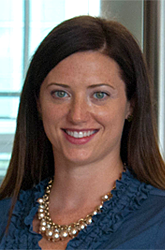You are here: Home > Unit on Reproductive and Regenerative Medicine
Reproductive Stem Cell Biology

- Erin F. Wolff, MD, Head, Unit on Reproductive and Regenerative Medicine
- Ryan Heitmann, DO, Reproductive Endocrinology and Infertility Fellow
- Lauren Libfraind, BA, Predoctoral Fellow
The Unit on Reproductive and Regenerative Medicine conducts translational research on disorders affecting reproduction. Particular areas of interest are endometrial stem cells and conditions affecting the endometrium, which can result in a wide variety of gynecologic problems such as scarring of the uterine cavity (Asherman's syndrome), abnormal uterine bleeding, endometriosis, infertility due to implantation failures, and recurrent pregnancy loss.
Current research
We focus on characterizing endometrial stem-cell function, possible therapeutic applications of endometrial stem cells, sources of endometrial stem cells, and cellular therapies to correct endometrial related conditions. The model systems we use include (i) patients at the NIH who have undergone hematopoietic stem-cell transplantation for non-malignant hematologic conditions (e.g., sickle cell disease); (ii) the autologous Rhesus macaque peripheral blood stem-cell transplant model created by our collaborators in the Tisdale Lab. We are using these models to study endometrial engraftment from bone marrow–derived cells and the endometrial effects of bone marrow–derived cells residing in the uterus.
In addition, we are studying a rare familial syndrome with a reproductive phenotype due to a germline mutation in the gene HRPT2. Patients with this disorder suffer from life-threatening heavy menstrual bleeding (often requiring hysterectomy at young ages), recurrent pregnancy loss, and benign and malignant uterine tumors (frequently mesodermal lineages). We are using endometrial cells from patients with this condition to generate reproductive disease–specific, induced pluripotent stem cells with which to study reproductive disorders.
Publications
- Wolff EF, Uchida N, Donahue RE, Metzger ME, Libfraind LL, Hill MJ, Tisdale JT. Peripheral blood stem cell transplants do not result in endometrial stromal engraftment. Fertil Steril 2012;E-pub ahead of print.
- Wolff EF, Hill MJ, Simonds WF, Segars JH. Aromatase inhibitor treatment of menorrhagia and subsequent pregnancy in a patient with familial hyperparathyroidism-jaw tumor syndrome. Fertil Steril 2012;E-pub ahead of print.
- Wolff EF, Gao XB, Yao KV, Du H, Andrews ZB, Elsworth JD, Taylor HS. Endometrial stem cell transplantation restores dopamine production in a Parkinson's disease model. J Cell Mol Med 2011;15(4):747-755.
- Santamaria X, Massasa E, Feng Y, Wolff E, Taylor HS. Derivation of insulin producing cells from human endometrial stromal stem cells and use in the treatment of murine diabetes. Mol Ther 2011;19(11):2065-2071.
- Wolff EF, Wolff AB, Du H, Taylor HS. Demonstration of multipotent stem cells in the adult human endometrium by in vitro chondrogenesis. Reprod Sci 2007;14:524-533.
Collaborators
- Robert E. Donahue, VMD, Hematology Branch, NHLBI, Bethesda, MD
- Cynthia Dunbar, MD, Hematology Branch, NHLBI, Bethesda, MD
- Sunni Mumford, PhD, Division of Epidemiology, Statistics & Prevention Research, NICHD, Rockville, MD
- William Simonds, MD, Metabolic Diseases Branch, NIDDK, Bethesda, MD
- Hugh S. Taylor, MD, Yale School of Medicine, New Haven, CT
- John Tisdale, MD, Molecular and Clinical Hematology Branch, NHLBI, Bethesda, MD

